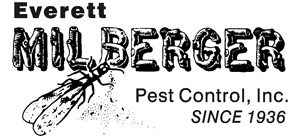Milberger Pest Control and many other PCO’s are making an Effort to Protect Beneficial Pollinators (honey bees)
There have been many articles and stories in the media – along with talk from government officials and agencies, including the White House –about the health of honey bees and other pollinators. Some of those words have been accurate; others, less so.
Researchers have determined that numerous factors threaten honey bees and other pollinators, but one primary threat is the lack of available sources for nectar and pollen. Years of urban sprawl have eliminated many natural habitats of foraging pollinators, as well as their nutrition sources.
Why are honey bees and pollinators – including butterflies, birds, bats, and beetles – so important to our environment? Consider these facts:
- Approximately 1,000 plants grown for food, beverages, fibers, spices, and medicines need to be pollinated in order to produce those finished products
- Foods produced with the help of pollinators are found on our dining table daily, including apples, strawberries, blueberries, chocolate, melons, peaches, figs, tomatoes, pumpkins, and almonds (notice that many of those crops are grown in abundance here in Kansas City)
- Pollination by honey bees and other insects produces nearly $20 billion of products annually in the United States
Milberger Pest Control, the National Pest Management Association, and the NPMA’s member companies across the United States have joined together to recognize National Pollinator Week to help focus attention on the health of pollinating organisms.
What can you do to promote pollinator health in your neighborhood or community? You can buy local honey and support community beekeepers, and you can plant flowers that are attractive to pollinators
By planting flowers, you’re playing a role in protecting the pollinators, and you’re also helping to support our nation’s food supply. Not only will bees and other pollinators benefit from this simple act of good will, but the colorful vegetation will make your home, yard, or patio more attractive and enjoyable.
Community and private gardens that contain flowers and plants attractive to pollinators can be extremely beneficial in providing new food sources. Milberger Pest Control recommends planting flowering plants, herbs, and vegetables, including wildflowers, lavender, sunflowers, goldenrod, honeysuckle, chives, oregano, and thyme.
Milberger Pest Control does want to issue a word of caution before you start planting your garden, though: Your garden should be a welcome oasis for bees raised by professional or hobby beekeepers, as these folks understand how to work safely with bees. Also, it’s a good idea to plant your gardens away from your house and outdoor seating areas.
If you do find a nest or hive in or around your home, call a licensed Milberger pest management professional to identify the type of insect present – do not attempt to remove the colony yourself. Once proper identification is made, your Milberger technician can remove the nest safely and address any threat, if needed.
If you have questions on pollinator health or stinging insects, call (816) 761-1313 or (913) 384-6760, or email: info@milbergerpestcontrol.com
